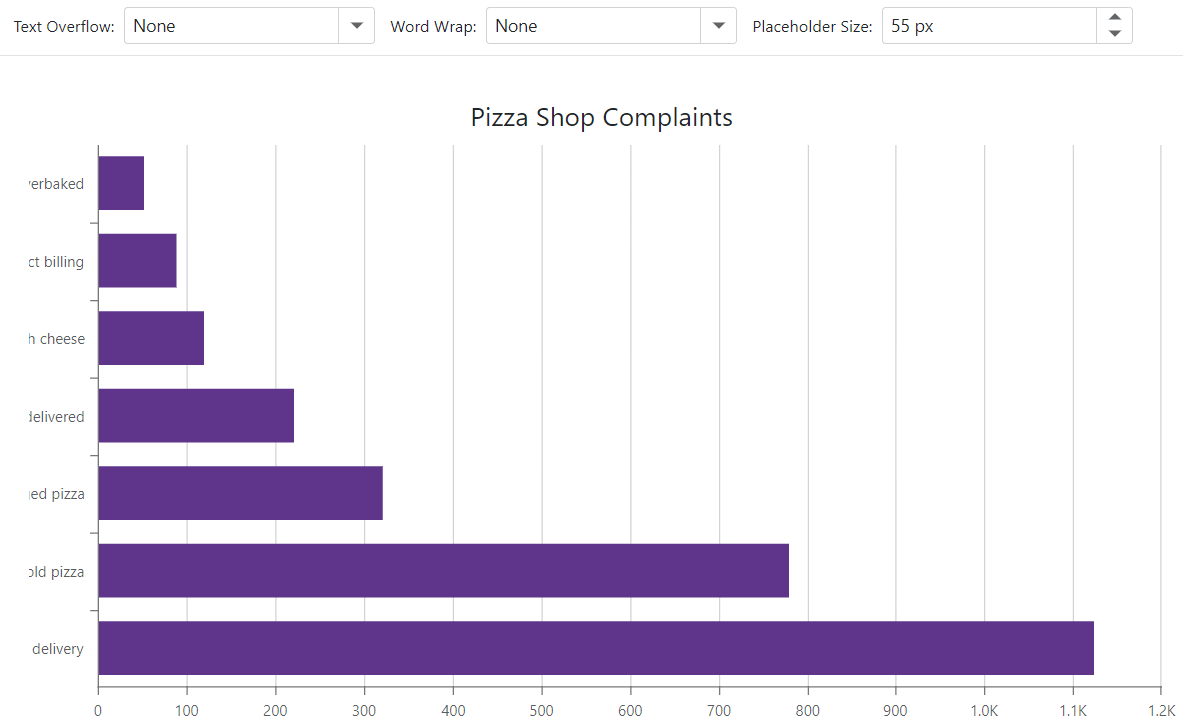ChartTextOverflow Enum
Lists values that specify how a chart displays text if it overflows the content area.
Namespace: DevExpress.Blazor
Assembly: DevExpress.Blazor.v25.2.dll
NuGet Package: DevExpress.Blazor
Declaration
public enum ChartTextOverflowMembers
| Name | Description |
|---|---|
Ellipsis
|
Truncates text with an ellipsis. |
Hide
|
Hides overflowing text. |
None
|
Truncates text at the boundary of the content area. |
Related API Members
The following properties accept/return ChartTextOverflow values:
Remarks
ChartTextOverflow values specify how to display text that does not fit into the available space.
The following example changes the content area size for the argument axis and uses drop-down menus to choose how to display axis labels:
<DxChart Data="@GetData()" Width="100%" Height="500" Rotated="true">
<DxChartTitle Text="Pizza Shop Complaints" CssClass="mb-2" />
<DxChartLegend Visible="false" />
<DxChartBarSeries ArgumentField="@((DataPoint s) => s.Complaint)"
ValueField="@((DataPoint s) => s.Count)" />
<DxChartTooltip Enabled="true">
<div class="m-3">
<div class="fw-bold">@context.Point.Argument</div>
<div>Complaint frequency: @context.Point.Value</div>
</div>
</DxChartTooltip>
<DxChartArgumentAxis PlaceholderSize="@CurrentPlaceholderSize">
<DxChartAxisLabel WordWrap="@CurrentWordWrap"
TextOverflow="@CurrentTextOverflow" />
</DxChartArgumentAxis>
</DxChart>
@code {
ChartTextOverflow CurrentTextOverflow = ChartTextOverflow.Ellipsis;
ChartWordWrap CurrentWordWrap = ChartWordWrap.Normal;
double CurrentPlaceholderSize = 55;
List<DataPoint> GetData() {
List<DataPoint> result = new List<DataPoint>(7);
result.Add(new DataPoint("Delayed delivery", 1123));
result.Add(new DataPoint("Cold pizza", 780));
result.Add(new DataPoint("Damaged pizza", 321));
result.Add(new DataPoint("Wrong size delivered", 222));
result.Add(new DataPoint("Not enough cheese", 120));
result.Add(new DataPoint("Incorrect billing", 89));
result.Add(new DataPoint("Underbaked or Overbaked", 52));
return result;
}
public class DataPoint {
public string Complaint { get; set; }
public int Count { get; set; }
public DataPoint(string complaint, int count) {
Complaint = complaint;
Count = count;
}
}
}

See Also